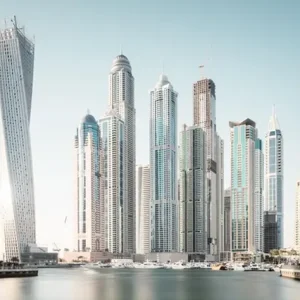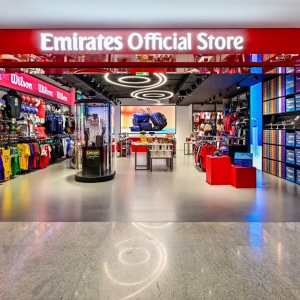Jebel Ali Port in Dubai has set a remarkable milestone by handling 630,000 tonnes of breakbulk cargo in October 2025, achieving its strongest performance in nearly two decades. This surge is closely linked to the solid pace of infrastructure expansion across the United Arab Emirates, highlighting Jebel Ali’s enduring reputation as one of the world’s leading maritime gateways.
The Achievement in Context
Handling 630,000 tonnes in a single month is a major benchmark for any major port, and this feat underscores Jebel Ali’s vital role in supporting the region’s ambitious economic plans. The port has consistently driven trade forward in the Gulf, positioning Dubai as a strategic link between global supply chains and fast-growing economies.
Jebel Ali’s robust cargo activity directly supports the construction of cutting-edge industrial zones, new transportation networks, and facilities in renewable energy and manufacturing. In addition to project cargo, the port’s effective management of heavy machinery, steel, and construction materials has been crucial for ongoing national development.

Infrastructure Boom and Regional Momentum
The spike in breakbulk cargo volumes is part of a wider surge fueled by the UAE’s relentless agenda in infrastructure and industrial development. Major government-led projects, including new transport corridors, energy sector initiatives, and advanced manufacturing clusters, are driving this demand.
The port is a preferred gateway for oversized shipments, such as power plant turbines, refinery equipment, and installation-ready construction steel. These imports, which have accounted for the majority of the port’s breakbulk activity throughout the year, ensure the steady progress of the nation’s largest ventures. As a result, Jebel Ali’s performance mirrors the momentum seen across the country’s economic landscape.

Operational Excellence and Efficiency
Jebel Ali’s historic monthly total was made possible by its consistent investment in advanced logistics and modern infrastructure. The port’s management has leveraged a combination of real-time cargo tracking systems, digital operations platforms, and AI-supported scheduling to maximize efficiency.
Staff training and a focus on safety and operational integrity further enhance throughput at the port. These factors combine to create a resilient supply chain environment that can handle high traffic and respond to the unpredictable demands of project-driven imports.
Much of the port’s success lies in its ability to synchronize vessel arrivals, equipment deployment, and inland transport in a seamless sequence, minimizing delays and improving reliability for shippers and consignees.
Technology and Sustainability Integration
Another pillar supporting this record performance is Jebel Ali’s commitment to sustainability and innovation. The port has integrated eco-friendly port vehicles and renewable energy into routine operations and invested in reducing carbon emissions from vessel activity.
Digital transformation also plays a critical role, with advances in automated gate systems, online document processing, and smart monitoring tools streamlining cargo flows. These improvements promote both environmental stewardship and cost savings, positioning Jebel Ali at the forefront of global port innovation.
Human Capital and Workforce Coordination
Despite the impressive technology in place, Jebel Ali’s workforce remains the backbone of daily operations. Teams of logistics professionals, stevedores, and customs officials collaborate to ensure that even the most complex or sensitive shipments can be handled efficiently and safely.
Continuous development programs equip staff with the digital skills needed to operate new machinery and manage the port’s sophisticated IT environments. This focus on both human and technological capital is key to maintaining high standards of service, especially during peak periods such as the one that delivered this long-awaited record.

Driving UAE’s Maritime Leadership
Jebel Ali Port’s record aligns with the UAE’s established reputation as a logistics powerhouse that connects over 180 shipping lines and more than 140 ports globally. This performance is a testament to Dubai’s long-term vision for building a resilient economy with world-class transport and logistics networks.
Growth in cargo volumes is not only a marker of local success but also signals the increasing appeal of the UAE as a regional trading hub for Africa, the Middle East, and South Asia. The ability to adapt rapidly and maintain reliability cements Jebel Ali’s leadership in global supply chains.
Looking Toward the Future
Planning for future demand is central to Jebel Ali’s operational strategy. The port is preparing expansions such as deeper berths, state-of-the-art cargo handling equipment, and enhanced intermodal connectivity through new rail and road links.
There are ongoing initiatives to boost predictive management using artificial intelligence, aiming to allocate resources more efficiently and reduce unnecessary delays. These measures will ensure that Jebel Ali remains ready to set new records as the needs of global trade evolve.
Conclusion
Jebel Ali Port’s achievement in October 2025 is a clear demonstration of operational brilliance and strategic foresight. Its ability to handle 630,000 tonnes of breakbulk cargo in one month reflects more than logistics—it is a direct product of sustained investment in infrastructure, skilled human resources, and innovative technology.
This success is helping to steer the UAE toward its broader economic targets, showing that with the right foundation, even the most ambitious national goals are within reach. The record not only raises the bar for the port but also sets an inspiring standard for ports across the region and beyond.
Do follow UAE Stories on Instagram
Read Next – SOL Properties Achieves Landmark AED 174 Million Sale for Dubai Triplex Sky Mansion














